#Protect Black LIves
Explore tagged Tumblr posts
Text
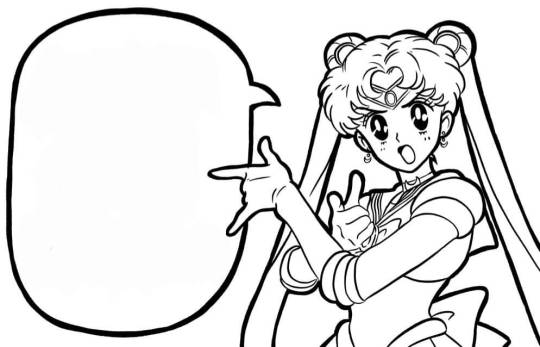
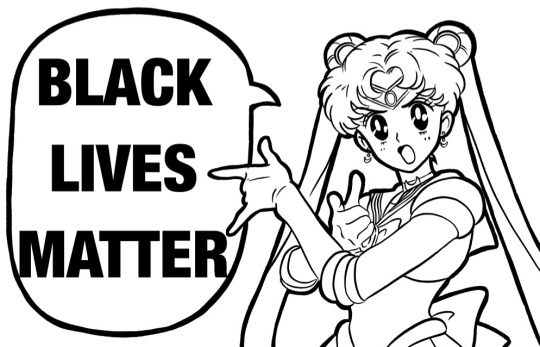
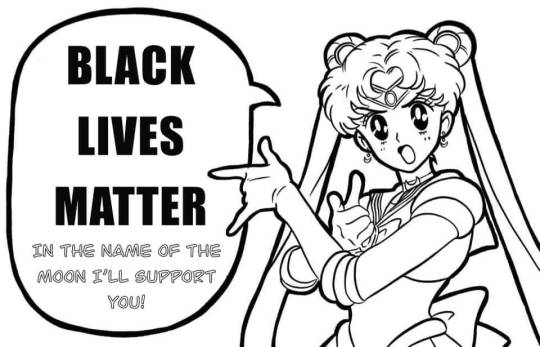
Stick to your rear windshield, your front door, your mailbox, wherever it needs to be seen. I didn't make the original blank template, so if you know who to credit that would be cool. Edit as you like to shout what social justice issue matters to you with the help of the OG SJW magical girl ✨️🌙✨️
#sailor moon#blm#black lives matter#social justice#sjw#social justice warrior#sailor moon says#protect black lives#sailor moon edit#meme#sailor moon meme#og sjw#shout your support#make it your own#blank template#trans lives matter#land back#indigenous lives matter#fight for justice#no justice no peace#you are on native land#say their names#abortion is a human right#keep abortion legal#abortion is healthcare#protect trans kids#protect trans rights#protect trans people#fuck colonialism#stonewall was a riot
321 notes
·
View notes
Text
“But if we defund the police who will protect us?” “But if we have no police who will you call when your in danger?” “We need police to keep us safe”
No, fuck you
I had to call 911 while I was at work (I’m a hotel concierge) and the woman who I’m calling to have removed is standing across from me screaming at me while I try and speak to the operator. By the time the police arrive (45+ mins later) I’ve managed to get the woman to leave (after she spent 30+ mins screaming at me and harassing guest) and after I told the cop he goes “cool, it all worked out!” I spent almost an hour shaking and had to lock the doors early.
I’ve had to call cops to come “deescalate ” situations several times and they have NEVER helped the situation, not once.
Once or twice a month a cruiser will come sit in the parking lot for about 5 hours and give ticket after ticket all day.
Defund police because they aren’t providing a useful service, defund police because they don’t arrive quick enough to actually do something and when they do they make the situation worse, defund police because they only put effort in their job is when they need to meet a quota, defund police because when I comes to MY SAFTEY it will ALWAYS be in MY HANDS!
Defund the police because when your calling as a person of colour you shouldn’t have to hope you get a “good cop” defund the police because I will NEVER call them when I’m having an issue with a black man because whatever he’s doing won’t be worth his death.
DEFUND THE FUCKING POLICE BECAUSE ITS A SYSTEM THAT WAS PUT IN PLACE TO PROTECT PRIVILEGED PEOPLE AND PRIVILEGED PEOPLE ONLY!! AND EVEN NOW IT BARELY DOES THAT!!
#defund the fucking police#defundthepolice#defund the cops#defund police#all cops are bastards#all cops are bad#protect black lives#fuck blue lives#tw cops#all cops are pigs#corrupt cops#anti cop#text post#The baby talks
156 notes
·
View notes
Video
youtube
The Deacons for The Defense -”people had gotten tired of all that jim crow mess, that is why the Deacons was born”
The Deacons · Frederick Douglass Kirkpatrick · Pete Seeger · Jeanne Humphries Ballads of Black America ℗ 2004 Smithsonian Folkways Recordings / 1972 Folkways Records Released on: 1972-01-01
#youtube#The Deacons for The Defense#Black History Songs#Mississippi#combat jim crow#Frederick Douglass Kirkpatrick#anti kkk#Protect Black LIves#Black History Matters#Black Lives Matter#Black Self Defense
6 notes
·
View notes
Text
The Unofficial Black History Book
The 16th Street Baptist Bombing (September 15th, 1963)

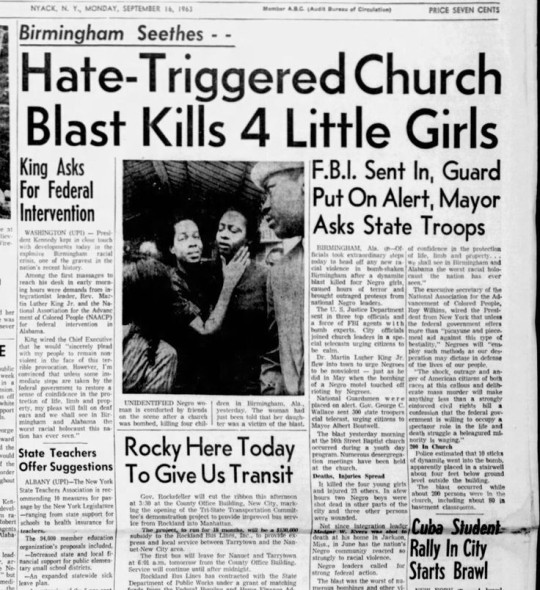


In the 1960s, Racial tension was at an all-time high. Many African Americans were doing their part in the fight for equal rights. A fight that claimed many innocent black lives.
Even the lives of four little girls.
This is the story.
The 16th Street Baptist Church was organized in 1873 as the first colored Baptist church in Birmingham, Alabama.
Many civil rights protest marches took place on the steps of the 16th Street Baptist Church. It has long been a significant religious center for the Black population and was a meeting place for civil rights organizers such as Dr. Martin Luther King Jr.
In the 1960s, Birmingham, Alabama, was one of America's most racially discriminatory and segregated cities and had one of the strongest and most violent chapters of the KKK. The city's police commissioner, Eugene "Bull" Connor, was known for his willingness to use brutality in combating radical union members, demonstrators, and innocent black citizens. Alabama's governor, George Wallace, was the leading opponent of desegregation.
By 1963, homemade bombs being set off in black homes and churches were such common occurrences that the city was given the nickname “Bombingham."
On September 15th, 1963, at 10:22 a.m., some 200 church members were in the building; most were attending Sunday school classes before the 11 a.m. service that morning.
A dynamite bomb was set off in the back stairwell, and mortar and bricks were thrown from the front of the church, caving in its walls. The violent blast ripped through the wall, killing four young African-American girls and injuring more than 20 others.
14-year-old Addie Mae Collins, 14-year-old Denise McNair, 14-year-old Carole Robertson, and 11-year-old Cynthia Wesley were in the basement of the church's ladies' restroom when they were crushed by the rubble.
Addie's sister, Sarah Collins, survived but lost her right eye.
The bombing of 16th Street Baptist Church was the third bombing in 11 days after a federal court order mandated the integration of Alabama's school system.
Upon learning of the attack, Reverend Martin Luther King Jr. sent a telegram to Alabama Governor George Wallace. He stated bluntly: "The blood of our little children is on your hands."
In the aftermath of the bombing, thousands of angry black protesters gathered at the scene of the bombing that same evening, and violence broke out across the city. Governor Wallace sent police and state troopers to break up the protesters. A handful of protesters were arrested, and two African-American youths were killed.
One at the hands of the police. And the other was murdered by a mob of white men.
This all happened before the National Guard was called to restore order.
The deaths of the four girls and the brutal attack shocked the nation and drew international attention to the violent struggle for civil rights in Birmingham.
Many whites were as outraged by the bombing as blacks and offered condolences to the families.
Over 8,000 people attended the girls' funeral services at Reverend John Porter's Sixth Avenue Baptist Church. The family of the fourth held a smaller private service. Dr. King spoke before the 8,000 people at the service.
It was a clear act of racial hatred, -- as the church was a key Civil Rights meeting place and had been a frequent target of bomb threats. KKK members routinely called in bomb threats intended to disrupt civil rights meetings and services.
In the investigation of the bombing, many of Birmingham's white supremacists and even certain individuals were immediately suspected. Repeated calls for the perpetrators to be brought to justice went unanswered for more than a decade.
It was revealed later that the FBI had information concerning the identity of the bombers in 1965 but did nothing.
The head of the FBI at the time was J. Edgar Hoover. He disapproved of the civil rights movement. It was rumored and claimed that Hoover held back evidence from prosecutors and even tried to block prosecution. He later died in 1972.
In 1977, Alabama Attorney General Bob Baxley reopened the investigation.
Klan leader Robert E. Chambliss was brought to trial for the bombings and was convicted of murder. He died in prison in 1985, still maintaining his innocence.
Later in 1980, 1988, and 1997, the case reopened again when two other former Klan members, Thomas Blanton, and Bobby Frank Cherry, were finally brought to trial. Blanton was convicted in 2001, and Cherry in 2002.
A fourth suspect, Herman Frank Cash, died in 1994 before he could be brought to trial.
The legal system was slow to provide justice, but the effect of the bombing was immediate and significant.
The outrage over the deaths of the four young girls helped build support for the struggle to end segregation. Support that would lead to the passage of both the Civil Rights Act of 1964 and the Voting Rights Act of 1965.
But even so, it couldn't bring back four young lives that were lost in an act of hatred.
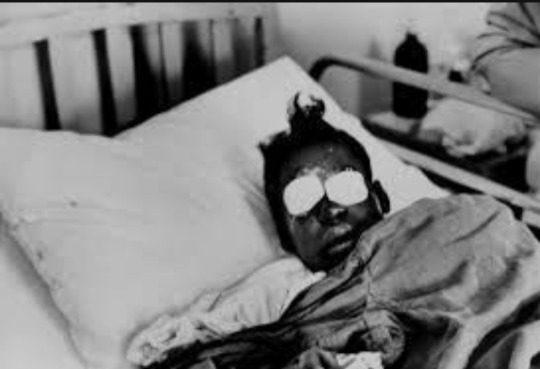
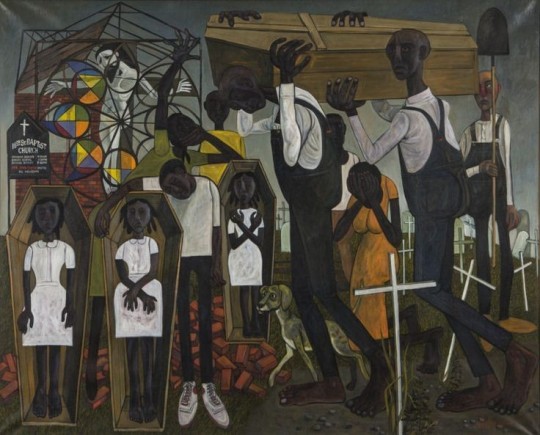
Painting: The 16th Street Baptist Chruch, By Mack Stanley - Asheville Art Museum
Prev
Phillis Wheatley
Next
Janet Collins
_____
My Resources
#black history matters#black history 365#black history is american history#black culture#black history#black tumblr#black lives fucking matter#protect black children#protect black lives#know your history#hate crimes#black stories#civil rights#learn your roots#black activism#protect black girls#civil rights movement#discrimination#history#social justice#cruel and unjust#the unofficial black history book#black female writers#say her name
14 notes
·
View notes
Text


camera roll gems
0 notes
Text
THIS ⬇️
youtube
Just gonna keep on posting stuff to remind All of you that BLACK LIVES MATTER.
Critical Race Theory should be mandatory for every single American. All Americans.
#black lives matter#blacklivesmatter#critical race theory#black history#black history is american history#black lives fucking matter#black lives are important#black is beautiful#critical race theory is critical#blm#black lives have always mattered#we the people#all of the people#we're all in this together#protect black lives#protect black children#protect black women#protect black girls#protect black people
1 note
·
View note
Text
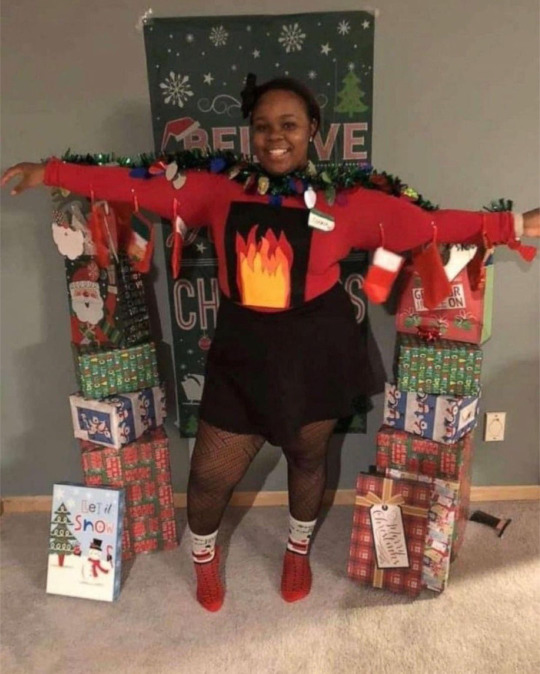
This was her FAVORITE time of year... She should be spending it with family... she should be be alive. I'm pissed she's not. I'm so so pissed. I'm hurt. on the verge of tears.
Please dont forget her face, her name, her smile, her caring soul.
She wanted to be a nurse. Wanted to help mothers and babies... And she never got to.
The world was a better place when she was in it...
Merry Christmas Breonna... Thinkin ab you...
#justice for breonna#breonna taylor#say her name#abolish the police#abolish capitalism#abolitionist#black lives fucking matter#protect black women#protect black girls#remember her always#merry christmas breonna#thinking ab her heavy today
3K notes
·
View notes
Text
#vote
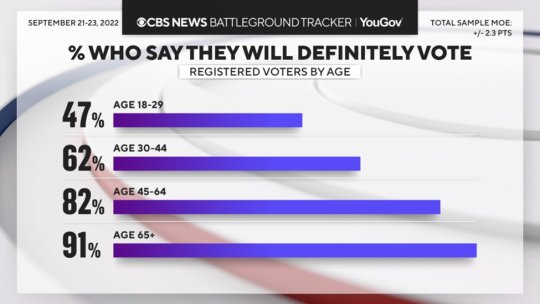
Saying "voting doesn't matter" might reach your younger peers online but it certainly hasn't reached Clangus Hargbarg who was part of the kkk in 1951 and still sends in his ballot. He hasn't missed a one.
#vote like your life depends on it#vote#voting#someone’s life depends on this election#vote out republicans#vote out fascism#protect trans kids#protect black lives
133K notes
·
View notes
Text
“The U.S. State Department has issued a warning for travelers to exercise “increased caution” due to a surge in crimes and the recent kidnapping of four Black Americans.”
#racism#hate crimes#Mexico#Black Americans#u.s. state department issues warning#Protect Black Lives#black lives matter#protect black children#protect black women#protect black men
0 notes
Text
#ibrahim traoré#black people#burkina faso#stay strapped#african leaders#protect him at all costs#blacklivesmatter#black lives matter#black excellence#africa
323 notes
·
View notes
Text
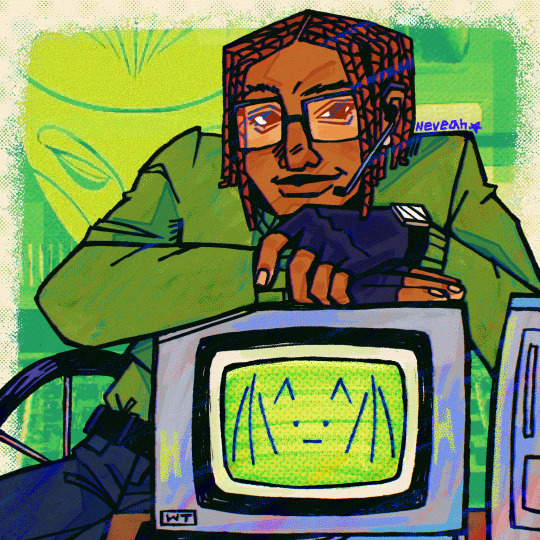
could it be ur face i see, on my computer screen?
#barbara gordon#bart (as in bug art)#babs gordon#oracle dc#batgirl#fixed up my babs design :) i looove her#i ended up giving her braids bc apparently all black vigilantes just have protective hair styles#<- which! makes sense in my brain! but the real reason for her is bc of#maxine from living single#for the 90s of it all#+ i wanted to make a black babs that was oracle#this is like a little treat to me#i will stop rambling now o7#dc#dc comics#detective comics#batman#oh! also rip babs gordon u would’ve loved objectum <- for henry
559 notes
·
View notes
Text
I voted. I tried. I love you.
— Millions of Americans for Kamala Harris
#kamala harris#kamala for president#election 2024#2024 presidential election#tim walz#trump is a felon#anti trump#vote democrat#anti republican#lgbtqia#black lives matter#protect trans kids#women’s rights
163 notes
·
View notes
Text
The Unofficial Black History Book
Ruby Bridges (1954-Currently Living)

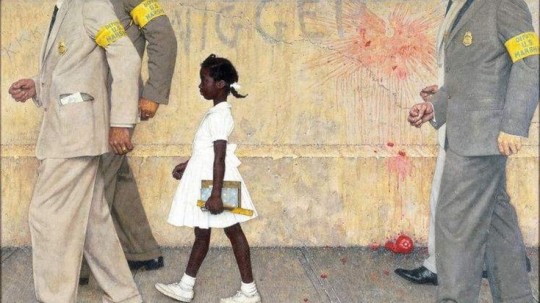
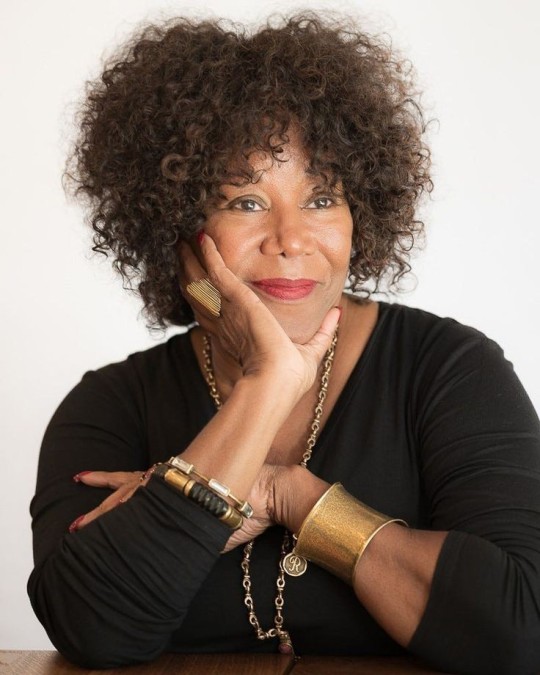

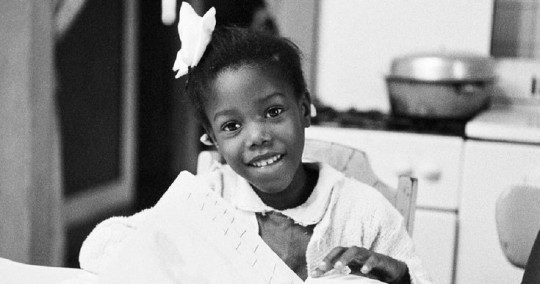



In 1960, a six-year-old African American girl unknowingly desegregated a white elementary school, paving the way for civil rights action in the South.
This is her story.
Ruby Nell Bridges was born on September 8th, 1954, the eldest of five children of Lucille and Abon Bridges, in Tylertown, Mississippi. She grew up on a farm with her parents and grandparents, who were sharecroppers. Her parents relocated to New Orleans when she was two years old in search of better job opportunities.
In 1954, the United States Supreme Court issued its decision in Brown v. The Board of Education of Topeka, Kansas, which ended racial segregation in public schools. Even so, southern states continued to oppose integration. When Ruby was in kindergarten, she was one of many African American students who were chosen to take a test determining whether or not she could attend a white school.
The test was designed to be particularly difficult so that students would struggle to pass it. Essentially, the plan was that if all of the African American children failed the test, New Orleans schools would be able to remain segregated for a longer period of time. However, Ruby and five other students passed the exam.
The Bridges family lived only five miles from an all-white school, but Ruby attended an all-black segregated school that was several miles away. Her parents were conflicted about sending her to an all-white school. Her father feared for his daughter’s safety, but her mother wanted Ruby to have a better education and better opportunities than her parents were denied.
NAACP officials informed Ruby's parents in 1960 that she had passed the test and would be the only African American child to attend the William Frantz School. Two other students decided not to leave their school at all, and the remaining three were assigned to the all-white McDonough Elementary School.
The school district went so far as to purposefully postpone Ruby's admission until November 14th. Ruby and her mother were escorted to school by four Federal Marshals on November 14th, 1960. They instructed Ruby not to look at the crowd.
As they approached the school, Ruby was met by a large group of white adults gathered behind barricades, as well as police stationed in front of the school. They hurled objects at Ruby, shouted racial slurs at her, and even expressed death wishes.
Ruby, being young and naïve, initially mistook it for a Mardi Gras parade. “I was really not aware that I was going to a white school; my parents never explained it to me. I stumbled into the crowds of people, and living here in New Orleans and being accustomed to Mardi Gras, the huge celebration that takes place in the city every year, I really thought that’s what it was that day. There was no need for me to be afraid of that.” Ruby states.
Every day, irate protesters, mostly white parents and children, as well as reporters and photographers, gathered outside. The crowd chanted and waved placards while yelling slurs. One sign read: “All I want for Christmas is a clean white school.” And there was a woman holding up a miniature coffin with a black doll inside. It was the only time Ruby was afraid.
In Ruby's own words, she said:
“That, I would have nightmares about, I would dream that the coffin was flying around my bedroom at night.”
Ruby spent her first day at school in the principal's office as a result of the chaos caused by angry white parents pulling their children out of school. Dedicated segregationists withdrew their children for good. Ruby had to bring her own lunch to school every day because she was afraid of being poisoned.
A woman from the crowd would yell out threats about poisoning and lynching Ruby. This was not revealed to her parents until much later.
All of the white parents eventually withdrew their children from school, and the entire faculty refused to teach Ruby.
The only teacher willing to accept Ruby was Barbara Henry, a white Boston native. For the first year, she was the sole student in the classroom. “We knew we had to be there for each other.” Says Bridges. Ms. Henry was also shunned by the rest of the faculty for agreeing to teach a young black student.
Ruby ate lunch alone in the classroom because she wasn’t allowed in the cafeteria. She wasn’t allowed to go to recess with the other kids, so she sometimes played with Ms. Henry. The Marshalls even escorted her to the bathroom.
Robert Coles, a white child psychiatrist who had witnessed the events outside the school, volunteered to help Ruby and her family. He would visit the home on a weekly basis to talk to Ruby.
Coles went on to pursue a career studying the effects of school desegregation on children. It was later revealed that one of his relatives had sent Ruby new school clothes that her family could not afford.
Some families supported Ruby's bravery, and some Northerners sent money to help her family, while others protested throughout the city against them. Her entire family would soon pay the price for their bravery. Her father, Abon, a Korean War veteran, had lost his job as a gas station attendant. Her mother, Lucille, lost her job as a domestic worker, and grocery stores refused to sell food to Lucille to feed her children. Even Ruby’s friends couldn’t come over to play anymore.
The NAACP, which had played an important role in Ruby's case, had advised Ruby's father not to go out and look for work for his own safety. Her sharecropping grandparents, who had lived on their farm for 25 years, were also evicted. And her parents eventually separated.
“I remember writing to Santa Claus and asking him to give my father’s job back, and that he didn’t have a job because I was going to school. So I guess somehow I did feel some blame for it.”
After an incident in which Ruby was stashing her food in the classroom during lunch because she was tired of eating alone, which resulted in a mouse infestation, Ms. Henry began sitting with Ruby during lunch.
Her eating habits had also changed at home; after Robert informed Ruby's parents about the white heckler outside the school and her threats to poison Ruby, she now only eats packaged food.
Things began to change gradually but steadily over the course of the first year. A small number of white parents allowed their children to return to school. They were initially separated from Ruby. In her own words, “The principal, who was part of the opposition, would take the kids, and she would hide them so that they could never come in contact with me.”
Ruby was finally allowed to be in a small class with other six-year-old children near the end of the year, thanks to Ms. Henry's persistence. Ruby recalls a little boy saying to her, “My momma said not to play with you because you’re a nigger.”
“And the minute he said that, it was like everything came together. All the little pieces that I’d been collecting in my mind all fit, and I then understood: The reason why there’s no kids here is because of me, and the color of my skin. That’s why I can’t go to recess. And it’s no Mardi Gras. It all sort of came together: A very rude awakening. I often say today that really was my first introduction to racism.” Bridges says.
She later realized that it was also a perception of the origins of racism. “The way that I was brought up, if my parents had said: ‘Don’t play with them - he’s white, he’s Asian, he’s Hispanic, he’s Indian, he’s whatever - I would not have played with him.” The young boy was merely explaining why he couldn't play with her; he was unaware that he was being racist toward her.
In Ruby’s words, “Which leads me to my point that racism is learned behavior. We pass it on to our kids, and it continues from one generation to the next. That moment proved that to me.”
One day, while being escorted to school, Ruby stopped to face the crowd, which was something she was instructed to do. Ms. Henry later asked her what she said. And Ruby said that she wasn’t talking; she was praying. Ruby would pray for the crowd of people who hated her. She forgot until she was in the midst of the crowd that morning.
“Please, God, try to forgive those people. Because even if they say those bad things, They don’t know what they’re doing. So you could forgive them, Just like you did those folks a long time ago when they said terrible things about you.” A prayer that she would say before and after school.
By the second year of school, the tension had gradually subsided. There were no protests, and she was in a normal-sized class with mostly white kids, though a few African American kids had joined by then. Eventually, Ms. Henry left William Frantz Elementary, which saddened Ruby. Regardless, they became lifelong friends.
She even adopted Ms. Henry's strong Boston accent and was chastised for it by her new teacher, one of those who had refused to teach her the previous year.
Every year, an increasing number of black students enrolled at William Frantz. High schools had been desegregated for nearly ten years when Ruby was in her teens, but black and white students still did not mix, and Ruby faced a lot of racial tension throughout high school.
The South's racist legacy remained strong. Despite being desegregated, her high school was named after a former Confederate general, Francis T. Nicholls. Its sports teams were called the Rebels, and their logo featured a Confederate flag, which black students fought to change. The school was renamed Frederick Douglass High School in the 1990s, and the team is now known as the Bobcats.
Ruby graduated from high school with no clear career path in mind, but she did know she wanted to leave Louisiana.
“I was really more focused on how to get out of Louisiana. I knew that there was something more than what I was exposed to right there in my community.”
She applied for jobs as a flight attendant before working as an American Express travel agent for 15 years. During that time, she got to see the world.
In her 30s, she married Malcolm Hall in 1984 and had four sons. She began to feel restless around this time.
“I was asking myself: ‘What am I doing?’ Am I doing something really meaningful?’ I really wanted to know what my purpose was in life.” She stated.
In 1993, Ruby’s brother was shot dead on a street in New Orleans, and she took in his four daughters, who also attended William Frantz Elementary.
In 1995, Robert Coles, Ruby's childhood psychiatrist who was now a Harvard professor, published his children's book, 'The Story of Ruby Bridges,' which reintroduced Ruby to the public eye.
Ruby's story was never really discussed in New Orleans. She explains in the same way that, for years, people in Dallas didn’t talk about the Kennedy assassination.
“You have to understand, we didn’t have Black History Month during that time. It wasn’t like I could pick up a textbook and open it up and read about myself.”
Ruby promoted Coles' book by speaking in schools across the country, and it went on to become a best-seller. In 1998, Disney made a biopic of Ruby Bridges, in which she acted as a consultant. “I think everybody started to realize that me, Ruby Bridges, was actually the same little girl as in the Norman Rockwell painting.”
The proceeds from the book aided Ruby in establishing her foundation. When she returned her nieces to William Frantz, she noticed a lack of after-school arts programs and decided to start her own. She continued touring schools across the country, telling her story and promoting cultural understanding.
She recently released a new book, 'This is Your Time,' which tells her story for today's youth.
After Hurricane Katrina damaged it in New Orleans in 2005, William Frantz was slated for demolition. As a result of Ruby's successful campaign to have the school listed on the National Register of Historic Places, funds were freed up to restore and expand it. In addition, there is a statue of Ruby in the school courtyard.
Ruby was not aware of Norman Rockwell's 1964 painting of her, 'The Problem We All Live With,' until much later in her life. It is not a faithful recreation of the scene; it is closer to John Steinbeck's eyewitness account in his 1962 book 'Travels with Charley in Search of America,' but, unlike Rockwell's earlier Cherry Americana, it captures the rage and drama: The N-word and “KKK” are scrawled across the wall, along with the splattered tomato behind young Ruby Bridges.
When Barack Obama was elected president, Ruby suggested that the Rockwell painting be hung in the White House to commemorate the event's 40th anniversary. He invited Ruby and her family to its unveiling and even gave her a big hug.
“It was a very powerful moment,” she says. “As we embraced, I saw people in the room tearing up and realized that it wasn’t just about he and I meeting; it was about those moments in time that came together. And all those sacrifices in between he and I. He then turned to me and said: ‘You know, it’s fair to say that if it had not been for this moment, for you all, I might not be here today.’ That in itself is just a stark reminder of how all of us are standing on someone else’s shoulders. Someone else that opened the door and paved the way. And so we have to understand that we cannot give up a fight, whether we see the fruit of our labor or not. You have a responsibility to open the door to keep this moving forward.”
Ruby explains that the white population began to leave the area in the middle of the 1960s, partly as a result of the damage caused by Hurricane Betsy in 1965, but also as a result of the district's changing demographics. As a result, William Frantz's student body is now entirely black.
It is happening right now in New Orleans: "White flight" has effectively resulted in a form of re-segregation in schools across the US, making it one of the city's poorest and most dangerous neighborhoods.
Ruby now sees this as her next activist battle.
Ruby Bridges, the six-year-old girl who bravely desegregated William Frantz Elementary, is now a Civil Rights activist who, at the age of 68, is bringing about change through education.
_
Previous
Maya Angelou
Next
Huey P. Newton
__
My Resources
#the unofficial black history book#ruby bridges#black history matters#black history#black history is american history#black culture#segregation#know your history#learn your roots#protect black children#protect black lives#civil rights#civil rights movement#social justice#black history is now#discrimination#history#herstory#black female writers#writers of tumblr#black excellence#black community#writers on tumblr#black liberation
9 notes
·
View notes
Text
IF YOU ARE ELIGIBLE TO VOTE IN THE US 2024 GENERAL ELECTION - VOTE.
i know it's not the anarchist thing to do
i know you might object to voting democrat
i know that resistance doesn't begin or end at the ballot box
but sometimes you have to park your ideological purity in order to have a tangible effect. They are not the same. when you take to the streets it is better you have a government that will ignore you at worst then a government that will shoot you.
And remember: they might agree on some points but they disagree on many more. Your defiance is compliance if you abstain from voting on a single issue.
ALSO: don't get pissy with democrats for not doing something if the thing in question was blocked by the house. HOUSE OF REPRESENTATIVES IS ALSO UP FOR ELECTION AND A REPUBLICAN MAJORITY IS ALMOST AS BAD AS TRUMP FOR PRESIDENT
FINALLY: yes this applies if you live in a red state. nothing is certain in life, and even less so in politics. besides, don't give anyone the excuse to say that x group isn't interested in politics so why bother voting.
#punk#us election 2024#us politics#voting#go vote#please vote#fucking vote#vote blue#kamala harris#fuck trump#protect trans lives#protests#black lives matter#lgbt#anarchism#vote anyway#trans punk#our trans punk experience
173 notes
·
View notes
Text
The reason calling women “females” isnt okay is the same reason calling black people “blacks” or trans people “transgenders” isn’t okay.
Notice how the missing word is “people”. When you take off that word and change the term from a noun to an adjective, you strip the humanity from the term.
“Female” isn’t a noun, just like “black” and “transgender” aren’t nouns. Female what? Female human? Female frog? It could be anything.
You aren’t calling women “females” because it’s sCiEnTiFiCaLLy aCuRaTe. You just don’t see them as people whose humanity is worth acknowledging.
But I know this little grammar lesson will probably go right over the heads of anyone it’s actually targeted at - seeing as y’all can’t grasp the concept of pronouns I don’t really expect you to understand adjectives.
#female#women#black women#trans pride#trans rights#protect trans rights#protect trans youth#support blm#black lives matter#feminism#pronouns#adjectives#grammar#trans women are women#nightramblestm#1k
1K notes
·
View notes
Text
These shirts are being sold for charity!!! 70% of funds made by these shirts go to their respective organization.



Sizes range from Small to 4X
Preorders are set from now until SEPTEMBER 10
#black lives matter#protect trans lives#free palestine#shirts for charity#charity#merch for charity#spreading this around#ify nwadiwe was wearing the blm one in d20 that’s how I found these#please boost#not sponsored
154 notes
·
View notes